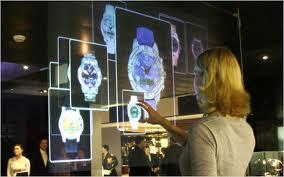In the past few years, the widespread use of 3D printing technology enables the growth of the market of 3D printed products. On Esty, a website focused on handmade items, hundreds of individual entrepreneurs are selling their 3D printed products. Inspired by the positive effects of machine-readable tags, like barcodes, on daily product marketing, we propose AnisoTag, a novel tagging method to encode data on the 2D surface of 3D printed objects based on reflection anisotropy. AnisoTag has an unobtrusive appearance and much lower extraction computational complexity, contributing to a lightweight low-cost tagging system for individual entrepreneurs. On AnisoTag, data are encoded by the proposed tool as reflective anisotropic microstructures, which would reflect distinct illumination patterns when irradiating by collimated laser. Based on it, we implement a real-time detection prototype with inexpensive hardware to determine the reflected illumination pattern and decode data according to their mapping. We evaluate AnisoTag with various 3D printer brands, filaments, and printing parameters, demonstrating its superior usability, accessibility, and reliability for practical usage.
翻译:过去几年中,广泛使用3D印刷技术使3D印刷产品市场的增长成为了3D印刷产品的市场增长。Esty是一个以手工制品为重点的网站,数百个个体企业家正在销售他们的3D印刷产品。在AnisoTag的启发下,在日常产品营销中,我们建议使用AnisoTag,这是一种基于反射反射反光的3D印刷品2D表面数据编码的新型标记方法。AnisoTag的外观不显眼,提取计算复杂性也低得多,为个体企业家的轻量低成本标签系统作出了贡献。在AnisoTag,数据被拟议工具编码为反反反反反色反色反色微结构,这将反映通过凝固激光辐照的明显无光模式。在此基础上,我们实施了一个实时检测原型,配有廉价的硬件,以确定反光化模式,并按照其绘图解码数据。我们用各种3D打印机品牌评估了AnisoTag的数据,展示了它的准确性、可获取性,并展示了我们的先进性。





